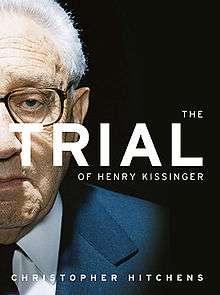The Trial of Henry Kissinger
 | |
| Author | Christopher Hitchens |
|---|---|
| Country | United States |
| Language | English |
| Subject | Henry Kissinger |
| Publisher | Verso |
Publication date | 2001 |
| Media type | Print (Hardback & Paperback) |
| Pages | 145 |
| ISBN | 1-85984-631-9 (hardback edition) |
| OCLC | 46240330 |
| 973.924/092 21 | |
| LC Class | E840.8.K58 H58 2001 |
The Trial of Henry Kissinger (2001) is Christopher Hitchens' examination of alleged war crimes of Henry Kissinger, the National Security Advisor and later United States Secretary of State for Presidents Richard Nixon and Gerald Ford. Acting in the role of the prosecution, Hitchens presents Kissinger's involvement in a series of alleged war crimes in Indochina, Bangladesh, Chile, Cyprus and East Timor.
Summary
In the words of Hitchens, Kissinger deserves prosecution "for war crimes, for crimes against humanity, and for offenses against common or customary or international law, including conspiracy to commit murder, kidnap, and torture."[1] He further calls him "a stupendous liar with a remarkable memory."[2]
The book takes the form of a prosecutorial document, as Hitchens limits his critique to such charges as he believes might stand up in an international court of law following precedents set at Nuremberg and elsewhere. These link Kissinger to war casualties in Vietnam, massacres in Bangladesh and Timor and assassinations in Chile, Cyprus, and Washington, D.C..
The book is written from an authorial position of moral outrage, and calls for Americans not to ignore Kissinger's record. In the author's words, "They can either persist in averting their gaze from the egregious impunity enjoyed by a notorious war criminal and lawbreaker, or they can become seized by the exalted standards to which they continually hold everyone else."[3]
Publication history
Highlights from the book were serialized in Harper's Magazine in February and March 2001.[4]
The book was re-issued in 2012 by Atlantic Books and Twelve Books along with two other short polemics by Hitchens, The Missionary Position, an attack on the status and celebrity of Mother Teresa, and No One Left to Lie To, a criticism of the political manoeuvring and personal character of President Bill Clinton.[5]
Documentary film
The book inspired the 2002 documentary film, The Trials of Henry Kissinger, which was co-written by Hitchens and fellow writer/director, Alex Gibney.[6] Hitchens makes an appearance in the film, being interviewed about Kissinger. The documentary also features film of Kissinger but only in archive footage.[7]
See also
References
- ↑ - Amazon
- ↑ "The Trial of Henry Kissinger". google.co.uk.
- ↑ "The Trial of Henry Kissinger". google.co.uk.
- ↑ "R.I.P. Christopher Hitchens - Harper's Magazine". Harper's magazine.
- ↑ "3 books by Hitchens to be reissued in April". The Washingtion Times.
- ↑ Howard Schumann (7 May 2003). "The Trials of Henry Kissinger (2002)". IMDb.
- ↑ Howard Schumann (7 May 2003). "The Trials of Henry Kissinger (2002)". IMDb.
External links
- The Trials of Henry Kissinger Google Video (now Youtube), 1 hr 19 min 41 sec
- The Trials of Henry Kissinger Official movie web site
- The Trials of Henry Kissinger at the Internet Movie Database